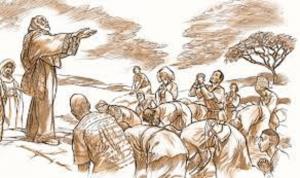One day several years ago, Jeanne said “I want a fish.” This was a rather random request, but Jeanne very seldom asks for anything, so within a few days we went to the pet store and purchased a Betta fish. Jeanne named him “Ezekiel” (more randomness), and he lived on the counter between our kitchen and dining room for over a year (longer than usual for a betta fish in captivity).
Google “Care of Betta fish” and you’ll get all sorts of conflicting advice concerning how often and what to feed your fish, how often to change the water, the proper temperature of said water, and more. The water must be distilled, for instance, but can’t be pristine—the fish needs a certain amount of self-generated bacteria to swim in. But when the water is so cloudy that you can hardly find the fish because of the floating food remnants and fish poop, chances are it needs to be changed.
On “clean the fish’s container day,” Ezekiel would be transferred to temporary quarters in a large wine glass while his more permanent home was rinsed thoroughly and filled with distilled water, to which Ezekiel was returned once it was warmed to the proper temperature. I’m sure it was a traumatic experience for him all around, but sometimes drastic measures are called for.
Providing Ezekiel with a cleaner and healthier habitat can serve as a metaphor for what human beings need periodically. All of us occasionally need help moving from unhealthy circumstances into a better and fresher atmosphere of promise and hope. How does one escape being stuck in an unhealthy situation with no end in sight, particularly when the person(s) who you believe responsible for the situation either deny that they are responsible or seem uninterested in helping craft a way forward? Returning to the work of Marilynne Robinson, whose work I have written about several times here over the past few weeks, I’ve found a few helpful suggestions over the past few days in her novel Gilead.
Gilead, remember, is a love letter from Rev. John Ames, a Congregational minister in the rural Iowa town of Gilead who is in his late seventies, to his eight year old son, a letter in which Ames seeks to pass on some of what he has learned to his son before he dies. Ames’ wife Lila, who is decades younger than Ames, wandered into his church when he was in his sixties, a beautiful but damaged soul to whom Ames was inexplicably but immediately attracted. They married soon after; Lila and their son are the joys of Ames’ life.
Lila is a woman of few words; those she uses have a meaning far beyond what lies on the surface. She frequently responds to possible slights and neglect by simply saying “It don’t matter.”
“It don’t matter.” That was what she said when she forgave someone, but it had a sound of deeper, sadder resignation, as if she were forgiving the whole of the created order, forgiving the Lord Himself.
From a lifetime of pain and sadness Lila has learned that she can move forward, not by pretending that the pain is not real, nor by pretending that devastating loss and crippling neglect are imaginary, but by invoking the power of forgiveness. This is a lesson that Reverend Ames takes to heart.
Ames is a model of goodness—simple, pure, and a light to all in his small community. Yet because he is human, he struggles with all sorts of matters, including Jack, the prodigal son of Ames’ best friend. Jack has been a source of pain and frustration to everyone throughout his life, leaving unfinished business and broken hearts in his wake. Now in his early forties, Jack has returned to Gilead after many years away and, as always, is disrupting Ames’ life as well as the lives of those Ames loves the most.
Ames tries to manufacture this forgiveness throughout the story, but it is not until the end of the novel that a breakthrough happens. Ames bumps into Jack in town and learns that Jack is leaving the area, probably for good, without telling his family. Ames agrees to tell Jack’s father goodbye for him, but then says “the thing I would like, actually, is to bless you.” He lays his hands on Jack’s head, and recites the Aaronic blessing from Leviticus:
 The Lord bless you and keep you. The Lord make His face to shine upon you and be gracious unto you: The Lord lift up His countenance upon you, and give you peace.
The Lord bless you and keep you. The Lord make His face to shine upon you and be gracious unto you: The Lord lift up His countenance upon you, and give you peace.
Jack gets on the bus, and we do not learn whether Ames’ blessing has any effect on him. But it is clear that in Ames the cycle of judgment and unforgiveness has been broken. As Lila might have said, Ames in that moment of blessing decides that, with regard to his past with Jack, “it don’t matter.” Each of us has the power to bless as well as to judge—blessing transforms the murky and dirty water of an unforgiven past into something clear and clean.
Everyone carries pain and damage in need of attention—as Ames says, “we human beings do real harm. History could make a stone weep.” Sadly, such pain and damage often become so familiar, especially when we don’t believe we caused them, that they become part of our story and comfort zone. Breaking the cycle requires saying “yes that happened, yes that hurt me, yes I am damaged goods because of it . . . and it don’t matter. I choose to change the water.” There is something magical, even sacred, about responding to perceived slights and harm with deliberate sacrament and blessing. Doing so touches both the forgiven and the forgiver. As Marilynne Robinson writes,
To be forgiven is only half the gift. The other half is that we also can forgive, restore, and liberate, and therefore we can feel the will of God enacted through us, which is the great restoration of ourselves to ourselves.
John Ames and Gilead are a primer in how to introduce blessing into the world. Throughout his adult life, when suffering from frequent insomnia, Ames would walk through the middle of Gilead, recalling who lived in each house and what he knew of their histories. And he would pronounce a prayerful blessing on them.
I’d imagine peace they didn’t expect and couldn’t account for descending on their illness or their quarreling or their dreams.
Such is my hope for those who need to bless the past and look with hope toward the future. Such is my prayer for all of us, including this nation that is so damaged and fractured by self-inflicted harms. Because in the end, there is only one thing to say about the various events and persons we blame for what keeps us from flourishing—it don’t matter.













